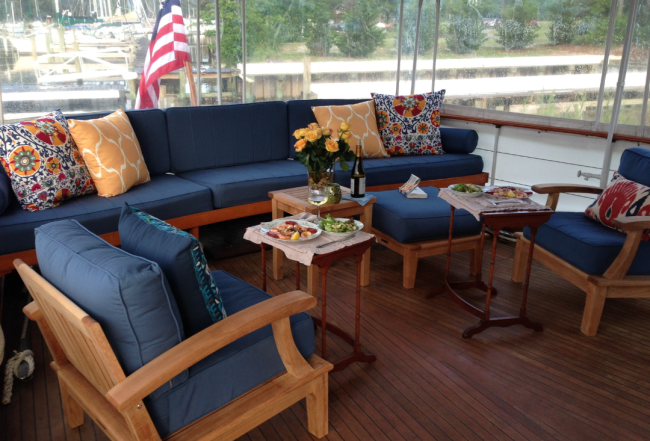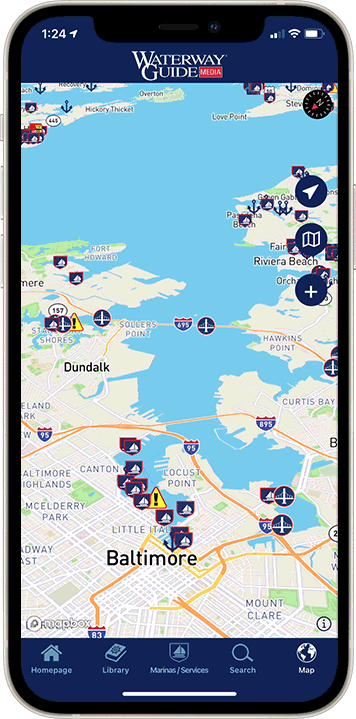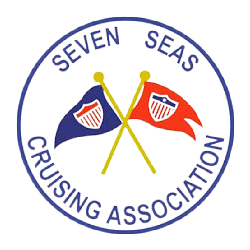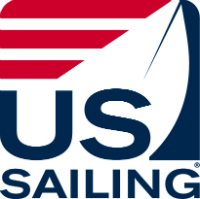Our friends at LobsterAnywhere came up with some advice on preparing meals while aboard. For anyone who has cruised the Northeast coast of the U.S., finding cold water lobster is always a treat, especially when combining it with fresh produce and bakery offerings from the locals. If you're not there, have it shipped in.
Cooking aboard a boat has its own pleasures and perils. Nautical cooking may be a tad more challenging than onshore cooking, but that's what makes it a more fun and unique experience. Some people (mostly people with minimal or no boat experience) are astounded when they learn that food can actually be cooked on a moving boat.
It is not only possible to cook on a boat, but it may also be a practical need when you are going to spend multiple days onboard. Cooking on boats is different than cooking on land. Even if you cook well on land, you need to learn about the nuances of cooking on a boat. But when you've mastered the art of cooking (overcoming the challenges of swaying, pitching, and heaving) on a boat, you will be able to enjoy many delicious hot meals over the cold seas.

Maybe you've never attempted cooking on a boat before, or maybe your initial terrible experience has kept you away from the little galley. If you've had a bad experience, it was probably due to a lack of information and practice. When you go in with proper information on how to handle ingredients and the cooking process onboard, you can and will get the desired results. You may even exceed your own expectations. These tips and tricks should help you get started with nautical cooking:
Plan ahead
You know that you need to pack your supplies into the limited space available on the boat. Pack multifunctional tools and ingredients that can be used for multiple recipes. Planning the meals will help ensure that you have the right ingredients in sufficient quantities when you need them. You could even prepare and freeze some of the ingredients before the passage so that the actual cooking process becomes easier and quicker.
Opt for simple, easy-to-prepare meals
Your best bet is one-pot meals. Such meals mean fewer dishes to wash eventually, less work, and less sloshing around of liquids during the cooking process. You'll be saving space on the boat as you won't have to carry too many pots and pans. Even if you aren't cooking one-pot meals, you should opt for dishes that require few ingredients. Leave the complex and elaborate recipes for onshore culinary adventures.
Learn to substitute ingredients
Despite your best planning and efforts, at times, you may find that you don't have certain ingredients at hand. You obviously cannot just run to a store and get it. On a boat, it's about making do with what you have. With some innovation and creativity, you can substitute other ingredients for the missing ones, and the prepared dish might actually taste even better. No one will ever know!
Water is also one of the ingredients used in cooking. Remember that you will have a limited supply of potable water onboard. This water is to be used for drinking as well as cooking. You can substitute water with other liquids wherever possible. For instance, for pasta sauce, you could use the liquid from canned corn, mushrooms, or even beans. Don't drain and toss out the water used for boiling noodles or vegetables. Use it in sauces and gravies instead. Alternatively, you can use seawater for boiling or steaming lobsters and thus capture their most authentic flavor.
Learn to work around the motion of the boat
The motion of the boat is what makes cooking onboard so different from cooking in an ordinary kitchen on land. You will need to work with a marine stove. Marine stoves are made with non-corrosive materials. These stoves are compact, gimbaled, and have pot restraints.
The boat will be moving most of the time, and the movement will be extra rough on some days. Every activity gets affected due to the motion of the boat. Think about the simple act of chopping while the boat is moving. To get the hang of it, you need to practice. Be cautious with things that could cause injuries when they slide around, like sharp knives or pots with hot liquids; avoid setting them down without restraints.

Wrapping Up
No one said cooking on a boat was a walk in the park. But once you start, it will be very rewarding and addictive. Managing all the ingredients and the cooking process on a moving boat is nothing less than an adventure in itself. It's advisable to make as much use of daylight as you can for nautical cooking. The best part about freshly cooked meals onboard is that even the simplest of dishes will be appreciated and enjoyed. The spectacular views and the fresh air will make the whole experience more memorable.











